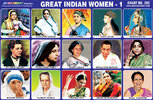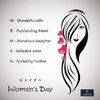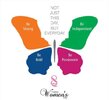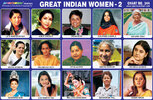You are using an out of date browser. It may not display this or other websites correctly.
You should upgrade or use an alternative browser.
You should upgrade or use an alternative browser.
Happy International Womens day
- Thread starter Beryl
- Start date
kar98
Wellknown Ace
Nuv super Thammudu
What is woman's super power?
A woman is not easily defined.
She is beautiful, and wild, elegant and controlled. There is no woman like another, and each is radiant in a special and unique way.
The ladies in our lives hold a special place in our hearts, and without them, we would not have the dreams and happiness we do. It is a privilege to celebrate all the magical things that makes a woman so incredibly special.
Women’s Day is our time to recognize and lift up women across the world. It is a day to take note of the wonderful contribution women make to society and life as a whole. Our sisters, wives, mothers, aunts, cousins and friends – the women, who we know, love and adore –have shaped and raised us to be where we are.
The women in leadership positions, teachers, role models, game changers, caregivers and forward thinkers – they are an inspiration to all. Each and every lady is a unique combination of strength, intelligence, love and beauty. A woman is never ever one single line. She is a glorious swaddle of characteristics and experiences that have the power to change lives. Across history, women have overcome limitations and have conquered demographical constraints.
The women in our lives and beyond contribute towards success and betterment – the sun doesn’t set without their love and contribution. It is important to recognize and appreciate the incredible and dynamic ladies in our lives. Each new day, they’re inspiring us in ways often difficult to describe. Without these beautiful women, the world would be a dull, empty place. A woman is a hearty combination of positive thoughts, bold colors, unconditional love and the need to give. She is timeless and powerful.
On Women’s Day, we celebrate the all-around, magnificent beauty that makes a woman;
- her strength,
- determination,
- caring ways,
- and selfless spirit.
A woman is not easily defined.
She is beautiful, and wild, elegant and controlled. There is no woman like another, and each is radiant in a special and unique way.
The ladies in our lives hold a special place in our hearts, and without them, we would not have the dreams and happiness we do. It is a privilege to celebrate all the magical things that makes a woman so incredibly special.
Women’s Day is our time to recognize and lift up women across the world. It is a day to take note of the wonderful contribution women make to society and life as a whole. Our sisters, wives, mothers, aunts, cousins and friends – the women, who we know, love and adore –have shaped and raised us to be where we are.
The women in leadership positions, teachers, role models, game changers, caregivers and forward thinkers – they are an inspiration to all. Each and every lady is a unique combination of strength, intelligence, love and beauty. A woman is never ever one single line. She is a glorious swaddle of characteristics and experiences that have the power to change lives. Across history, women have overcome limitations and have conquered demographical constraints.
The women in our lives and beyond contribute towards success and betterment – the sun doesn’t set without their love and contribution. It is important to recognize and appreciate the incredible and dynamic ladies in our lives. Each new day, they’re inspiring us in ways often difficult to describe. Without these beautiful women, the world would be a dull, empty place. A woman is a hearty combination of positive thoughts, bold colors, unconditional love and the need to give. She is timeless and powerful.
On Women’s Day, we celebrate the all-around, magnificent beauty that makes a woman;
- her strength,
- determination,
- caring ways,
- and selfless spirit.
Last edited:

- Madam Cama – Madam Cama was a prominent personality of the Indian Nationalist Movement. On August 22, 1907, she raised the flag for India's Independence at the International Socialist Conference in Stuttgart, Germany.
- Kasturba Gandhi - Kasturba Mohandas Gandhi was the wife of Mahatma Gandhi. Working closely with her husband, Kasturba Gandhi became a political activist fighting for civil rights and Indian independence from the British.
- Rani Laxmibai - Laxmibai, the Rani of Jhansi, born as Manikarnika, was the queen & warrior of the Maratha-ruled Jhansi State, situated in the north-central part of India. She was one of the leading figures of the Indian Rebellion of 1857 and became for Indian nationalists a symbol of resistance to the British Raj.
- Noor Jahan - Noor Jahan was an empress who belonged to the great Mughal Dynasty. Noor Jahan was the wife of the Mughal Emperor Jahangir. Her real name was Mehr-un-Nisaa. Noor Jahan's great poetic works, along with her interests in the traditional Persian culture of perfume-making, jewellery, rich fabrics and newest designed fashionable attire, form a significant source of the Mughal's contribution to India.
- Mumtaz Mahal - Mumtaz Mahal was the beloved wife of the Mughal Emperor Shah Jahan, in whose fond memory and tribute to her beauty was the grand monument of the Taj Mahal built.
- Dr. Annie Besant – Dr. Annie Besant was a prominent Theosophist, social reformer, political leader, women's rights activist, writer and orator. She was of Irish origin and made India her second home. She fought for the rights of Indian In 1916, she founded Home Rule League which advocated self rule by Indians. She became the President of Indian National Congress in 1917. She was the first woman to hold that post.
- Vijaya Laxmi Pandit - Vijaya Lakshmi Nehru Pandit was an Indian diplomat and politician. She was the sister of Jawaharlal Nehru. She was the first Indian woman to hold a cabinet post. In 1953, she became the first woman President of the United Nations General Assembly.
- Indira Gandhi - Indira Gandhi was a key 20th century stateswoman, a central figure of the Indian National Congress party and to date the only female Prime Minister of India. She served as Prime Minister from 1966 to 1977 and then again from 1980 until her assassination in 1984.
- Sarojini Naidu - Sarojini Naidu was a distinguished poet & a renowned freedom fighter. She was famously known as Bharatiya Kokila (The Nightingale of India). Sarojini Naidu was the first Indian woman to become the President of the Indian National Congress and the first woman to become the governor of a state in India.
- Mother Teresa - Mother Teresa was one of the great servants of humanity. She was an Albanian Catholic nun who came to India and founded the Missionaries of Charity in Kolkata. Her selfless work among the poverty-stricken people of Kolkata is an inspiration for people all over the world and she was honored with Nobel Prize for her work.
- Rajmata Scindia - Vijaya Raje Scindia known popularly as the Rajmata Scindia of Gwalior was a prominent Indian political personality. In the days of the British Raj, as consort of the last ruling Maharaja of Gwalior, Jivajirao Scindia, she ranked among the highest royal figures of the land. In later life, she became a politician of considerable influence and was elected repeatedly to both houses of the Indian parliament.
- Protima Bedi - Protima Bedi was an Indian model turned Odissi exponent. Her most important contribution to the field of classical Indian dance was with the establishment of 'Nrityagram', a dance institute, near Bangalore.
- Mrinali Sarabhai - Mrinalini Sarabhai was an Indian classical dancer, choreographer and instructor. She was the founder of the Darpana Academy of Performing Arts, an institute for imparting training in dance, drama, music and puppetry, in the city of Ahmedabad. She trained over 18,000 students in Bharatnatyam and Kathakali.
- Sonal Mansingh - Sonal Mansingh is an Indian classical dancer and choreographer of Odissi dancing style; who is also proficient in other Indian classical dancing styles including Bharatnatyam, Kuchipudi and Chhau. She has won many awards, including the Padma Bhushan (1992), Sangeet Natak Akademi Awardin 1987 and the Padma Vibhushan, India's the second highest civilian award, in 2003.
Last edited:
1. Lata Mangeshkar - Lata Mangeshkar is an Indian playback singer. She is one of the best-known and most respected playback singers in India. Mangeshkar's career started in 1942 and has spanned over seven decades. She has recorded songs for over a thousand Hindi films and has sung songs in over thirty-six regional Indian languages and foreign languages. She is the second vocalist, after M. S. Subbulakshmi, to have ever been awarded the Bharat Ratna, India's highest civilian honour.
2. Asha Bhosle - Asha Bhosle is best known as a playback singer in Hindi cinema, although she has a wider repertoire. She has done playback singing for over a thousand Bollywood movies. Renowned for her voice range and often credited for her versatility, Bhosle's work includes film music, pop, ghazals, bhajans, traditional Indian classical music, folk songs, qawwalis and Rabindra Sangeets. In 2011, she was officially acknowledged by the Guinness Book of World Records as the most recorded artist in music history.
3. Kiran Bedi - Kiran Bedi is a retired Indian Police Service officer, social activist, former tennis player and politician who is the current Lieutenant Governor of Puducherry. She is the first woman to join the Indian Police Service(IPS) in 1972. She remained in service for 35 years.
4. Kalpana Chawla - Kalpana Chawla was an Indo-American astronaut and the first woman of Indian origin in space. She first flew on Space Shuttle Columbia in 1997 as a mission specialist and primary robotic arm operator. Kalpana Chawla died in the Space Shuttle Columbia disaster which occurred on February 1, 2003, when the Columbia disintegrated over Texas during re-entry into the Earth's atmosphere, with the death of all seven crew members.
5. Gayatri Devi - Maharani Gayatri Devi was the third Maharani consort of Jaipur from 1940 to 1949 through her marriage to Maharaja Sawai Man Singh II. Following her husband's signature for the Jaipur State to become part of the Union of India, she was later known as 'Maharani Gayatri Devi, Rajmata of Jaipur. Following India's independence, she became an extremely successful politician. Gayatri Devi was also celebrated for her classical beauty and became something of a fashion icon in her adulthood.
6. Sonia Gandhi - Sonia Gandhi is an Italian-born Indian politician, who has served as President of the Indian National Congress party since 1998. She is the widow of former Prime Minister of India, Rajiv Gandhi. In 2013, Sonia Gandhi was overall ranked 21st and 3rd most powerful woman in Forbes powerful list.
7. Arundhati Roy - Arundhati Roy is an Indian author who is best known for her novel 'The God of Small Things' (1997), which won the Man Booker Prize for Fiction in 1997. This novel became the biggest-selling book by a non expatriate Indian author. She is also a political activist involved in human rights and environmental causes.
8. Jayalalitha - Jayaraman Jayalalithaa commonly referred to as Amma by members in her party and by people of Tamil Nadu. She is an Indian politician and the Chief Minister of Tamil Nadu, in office since 2015. Previously she served as Chief Minister from 1991 to 1996, in 2001, from 2002 to 2006 and from 2011 to 2014. She was an actress before her entry into politics and appeared in 140 films which includes Tamil, Telugu and Kannada films. Jayalalithaa became the first incumbent chief minister in India to be disqualified from holding office due to conviction in a disproportionate assets case, she was later acquitted.
9. Medha Patkar - Medha Patkar is an Indian social activist and social reformer turned politician. She is the founder member of Narmada Bachao Andolan and was National Convener of National Alliance of People's Movements (NAPM), an alliance of progressive people's organisations. She was a representative to the World Commission on Dams, to research the environmental, social and economic impacts of the development of large dams globally.
10. Maneka Gandhi - Maneka Sanjay Gandhi is the Indian Union Cabinet Minister for Women & Child Development in the Government of PM Narendra Modi. She is also an animal rights activist, environmentalist and widow of the Indian politician, Sanjay Gandhi. She has been a minister in four governments and has authored a number of books in the areas of etymology, law and animal welfare. Maneka Gandhi is a member of the Nehru-Gandhi Family.
11. Sushmita Sen - Sushmita Sen is an Indian film actress, model and the winner of the Miss Universe pageant of 1994. She was the first Indian to win the crown. After completing her reign, Sushmita Sen went on to pursue a career in Bollywood.
12. Aishwarya Rai - Aishwarya Rai, is an Indian actress, model and the winner of the Miss World pageant of 1994. Through her Bollywood acting career, she has established herself as one of the most popular and high-profile celebrities in India. Rai has received several awards, including two Filmfare Awards and she was awarded the Padma Shri by the Government of India in 2009. She is often cited as the "most beautiful woman in the world".
13. Mallika Sarabhai - Mallika Sarabhai is an activist and Indian classical dancer from Ahmedabad, Gujarat. Daughter of a classical dancer Mrinalini Sarabhai and renowned space scientist Vikram Sarabhai, Mallika is an accomplished Kuchipudi and Bharatanatyam dancer and performer who has specialized in using the arts for social change and transformation. She is a noted choreographer and dancer and has also acted in a few Hindi, Malayalam, Gujarati and international films.
14. Bachendri Pal - Bachendri Pal is an Indian mountaineer, who in 1984 became the first Indian woman to reach the summit of Mount Everest. After summitting a number of smaller peaks, she was selected to join India's first mixed-gender team to attempt an expedition to Mount Everest in 1984. She was awarded Arjuna award & Padma Shri award by the Government of India.
15. Sania Mirza - Sania Mirza is an Indian professional tennis player who is ranked No. 1 in the women's doubles rankings. From 2003 until her retirement from singles in 2013, she was ranked by the WTA as India's No. 1 player, both in singles and doubles. She is the highest-ranked female player ever from India, peaking at world No. 27 in singles in mid-2007. She has won 6 grand slam titles in doubles, 3 each in mixed doubles & women's doubles. She won various awards like Arjuna Award, Rajiv Gandhi Khel Ratna, Padma Shri & Padma Bhushan.
2. Asha Bhosle - Asha Bhosle is best known as a playback singer in Hindi cinema, although she has a wider repertoire. She has done playback singing for over a thousand Bollywood movies. Renowned for her voice range and often credited for her versatility, Bhosle's work includes film music, pop, ghazals, bhajans, traditional Indian classical music, folk songs, qawwalis and Rabindra Sangeets. In 2011, she was officially acknowledged by the Guinness Book of World Records as the most recorded artist in music history.
3. Kiran Bedi - Kiran Bedi is a retired Indian Police Service officer, social activist, former tennis player and politician who is the current Lieutenant Governor of Puducherry. She is the first woman to join the Indian Police Service(IPS) in 1972. She remained in service for 35 years.
4. Kalpana Chawla - Kalpana Chawla was an Indo-American astronaut and the first woman of Indian origin in space. She first flew on Space Shuttle Columbia in 1997 as a mission specialist and primary robotic arm operator. Kalpana Chawla died in the Space Shuttle Columbia disaster which occurred on February 1, 2003, when the Columbia disintegrated over Texas during re-entry into the Earth's atmosphere, with the death of all seven crew members.
5. Gayatri Devi - Maharani Gayatri Devi was the third Maharani consort of Jaipur from 1940 to 1949 through her marriage to Maharaja Sawai Man Singh II. Following her husband's signature for the Jaipur State to become part of the Union of India, she was later known as 'Maharani Gayatri Devi, Rajmata of Jaipur. Following India's independence, she became an extremely successful politician. Gayatri Devi was also celebrated for her classical beauty and became something of a fashion icon in her adulthood.
6. Sonia Gandhi - Sonia Gandhi is an Italian-born Indian politician, who has served as President of the Indian National Congress party since 1998. She is the widow of former Prime Minister of India, Rajiv Gandhi. In 2013, Sonia Gandhi was overall ranked 21st and 3rd most powerful woman in Forbes powerful list.
7. Arundhati Roy - Arundhati Roy is an Indian author who is best known for her novel 'The God of Small Things' (1997), which won the Man Booker Prize for Fiction in 1997. This novel became the biggest-selling book by a non expatriate Indian author. She is also a political activist involved in human rights and environmental causes.
8. Jayalalitha - Jayaraman Jayalalithaa commonly referred to as Amma by members in her party and by people of Tamil Nadu. She is an Indian politician and the Chief Minister of Tamil Nadu, in office since 2015. Previously she served as Chief Minister from 1991 to 1996, in 2001, from 2002 to 2006 and from 2011 to 2014. She was an actress before her entry into politics and appeared in 140 films which includes Tamil, Telugu and Kannada films. Jayalalithaa became the first incumbent chief minister in India to be disqualified from holding office due to conviction in a disproportionate assets case, she was later acquitted.
9. Medha Patkar - Medha Patkar is an Indian social activist and social reformer turned politician. She is the founder member of Narmada Bachao Andolan and was National Convener of National Alliance of People's Movements (NAPM), an alliance of progressive people's organisations. She was a representative to the World Commission on Dams, to research the environmental, social and economic impacts of the development of large dams globally.
10. Maneka Gandhi - Maneka Sanjay Gandhi is the Indian Union Cabinet Minister for Women & Child Development in the Government of PM Narendra Modi. She is also an animal rights activist, environmentalist and widow of the Indian politician, Sanjay Gandhi. She has been a minister in four governments and has authored a number of books in the areas of etymology, law and animal welfare. Maneka Gandhi is a member of the Nehru-Gandhi Family.
11. Sushmita Sen - Sushmita Sen is an Indian film actress, model and the winner of the Miss Universe pageant of 1994. She was the first Indian to win the crown. After completing her reign, Sushmita Sen went on to pursue a career in Bollywood.
12. Aishwarya Rai - Aishwarya Rai, is an Indian actress, model and the winner of the Miss World pageant of 1994. Through her Bollywood acting career, she has established herself as one of the most popular and high-profile celebrities in India. Rai has received several awards, including two Filmfare Awards and she was awarded the Padma Shri by the Government of India in 2009. She is often cited as the "most beautiful woman in the world".
13. Mallika Sarabhai - Mallika Sarabhai is an activist and Indian classical dancer from Ahmedabad, Gujarat. Daughter of a classical dancer Mrinalini Sarabhai and renowned space scientist Vikram Sarabhai, Mallika is an accomplished Kuchipudi and Bharatanatyam dancer and performer who has specialized in using the arts for social change and transformation. She is a noted choreographer and dancer and has also acted in a few Hindi, Malayalam, Gujarati and international films.
14. Bachendri Pal - Bachendri Pal is an Indian mountaineer, who in 1984 became the first Indian woman to reach the summit of Mount Everest. After summitting a number of smaller peaks, she was selected to join India's first mixed-gender team to attempt an expedition to Mount Everest in 1984. She was awarded Arjuna award & Padma Shri award by the Government of India.
15. Sania Mirza - Sania Mirza is an Indian professional tennis player who is ranked No. 1 in the women's doubles rankings. From 2003 until her retirement from singles in 2013, she was ranked by the WTA as India's No. 1 player, both in singles and doubles. She is the highest-ranked female player ever from India, peaking at world No. 27 in singles in mid-2007. She has won 6 grand slam titles in doubles, 3 each in mixed doubles & women's doubles. She won various awards like Arjuna Award, Rajiv Gandhi Khel Ratna, Padma Shri & Padma Bhushan.

. Madam Cama - Madam Cama was a prominent personality of the Indian Nationalist Movement. On August 22, 1907, she raised the flag for India's Independence at the International Socialist Conference in Stuttgart, Germany.
2. Capt. Lakshmi Sehgal - Lakshmi Sehgal was a revolutionary of the Indian independence movement, an officer of the Indian National Army and the Minister of Women's Affairs in the Azad Hind government. Sehgal is commonly referred to in India as "Captain Lakshmi".
3. Kamaladevi Chattopadhyay - Kamaladevi Chattopadhyay was an Indian social reformer and freedom fighter. She is most remembered for her contribution to the Indian independence movement for being the driving force behind the renaissance of Indian handicrafts, handlooms and theatre in independent India and for upliftment of the socio-economic standard of Indian women by pioneering the co-operative movement.
4. Rani Laxmi Bai - Laxmibai, the Rani of Jhansi, born as Manikarnika, was the queen & warrior of the Maratha-ruled Jhansi State, situated in the north-central part of India. She was one of the leading figures of the Indian Rebellion of 1857 and became for Indian nationalists a symbol of resistance to the British Raj.
5. Kasturba Gandhi - Kasturba Mohandas Gandhi was the wife of Mahatma Gandhi. Working closely with her husband, Kasturba Gandhi became a political activist fighting for civil rights and Indian independence from the British.
6. Aruna Asaf Ali - Aruna Asaf Ali was an Indian independence activist. She is widely remembered for hoisting the Indian National Congress flag at the Gowalia Tank maidan in Bombay during the Quit India Movement, 1942. She received India's highest civilian award, the Bharat Ratna, posthumously in 1997.
7. Hansa Mehta - Hansa Mehta was a reformist, social activist, educator, independence activist and writer from India. She organised picketing of shops selling foreign clothes, liquor and participated in other freedom movement activities as per the advice of Mahatma Gandhi. She was even arrested and sent to jail by the British.
8. Pritilata Waddedar - Pritilata Waddedar was a Bengali revolutionary nationalist. Pritilata joined a revolutionary group headed by Surya Sen. She led a team of fifteen revolutionaries in a 1932 attack on the Pahartali European Club. The revolutionaries torched the club and were later caught by the British police. To avoid getting arrested, Pritilata consumed cyanide and died.
9. Rajkumari Amrit Kaur - Rajkumari Amrit Kaur was a freedom fighter and a social activist. For her participation in Dandi March in 1930, British Raj authorities imprisoned her. In 1942, she participated in the Quit India Movement and was imprisoned again.
10. Sarojini Naidu - Sarojini Naidu was a distinguished poet & a renowned freedom fighter. She was famously known as Bharatiya Kokila (The Nightingale of India). Sarojini Naidu was the first Indian woman to become the President of the Indian National Congress and the first woman to become the governor of a state in India.
11. Kamla Nehru - Kamala Nehru was a freedom fighter & wife of Jawaharlal Nehru. Kamala was involved with the Nehrus in the national movement, she emerged into the forefront, in the Non Cooperation movement of 1921, she organised groups of women in Allahabad and picketed shops selling foreign cloth and liquor. She was arrested on two occasions for involvement in independence struggle activities.
12. Sucheta Kriplani - Sucheta Kriplani was an Indian freedom fighter and politician. She came to the forefront during the Quit India Movement. She later worked closely with Mahatma Gandhi during the Partition riots. She was also the founder of All India Mahilla Congress, established in 1940.
13. Dr. Annie Besant - Dr. Annie Besant was a prominent Theosophist, social reformer, political leader, women's rights activist, writer and orator. She was of Irish origin and made India her second home. She fought for the rights of Indian In 1916, she founded Home Rule League which advocated self rule by Indians. She became the President of Indian National Congress in 1917. She was the first woman to hold that post.
14. Vijaya Lakshmi Pandit - Vijaya Lakshmi Nehru Pandit was an Indian diplomat and politician. She was the first Indian woman to hold a cabinet post. In 1937 she was elected to the provincial legislature of the United Provinces and was designated minister of local self-government and public health. She held the latter post until 1939 and again from 1946 to 1947.
15. Usha Mehta - Usha Mehta was a Gandhian and freedom fighter of India. She is also remembered for organising the Congress Radio, also called the Secret Congress Radio, an underground radio station, which functioned for few months during the Quit India Movement of 1942.
16. Begam Hazrat Mahal - Begum Hazrat Mahal also known as Begum of Awadh. She rebelled against the British East India Company during the Indian Rebellion of 1857. She took charge of the affairs in the state of Awadh and seized control of Lucknow. She also arranged for her son, Prince Birjis Qadra, to become Wali (ruler) of Awadh. However, he was forced to abandon this role after a short reign. She finally found asylum in Nepal where she died in 1879.
17. Durgabai Deshmukh - Durgabai Deshmukh was an Indian freedom fighter, lawyer, social worker and politician. She was a member of the Constituent Assembly of India and of the Planning Commission of India. She was a follower of Mahatma Gandhi in India's struggle for freedom from the British Raj and a prominent social reformer who participated in Gandhi-led Satyagraha activities. This led to British Raj authorities imprisoning her three times.
18. Kalpana Datta - Kalpana Datta was an Indian independence movement activist and a member of the armed independence movement led by Surya Sen, which carried out the Chittagong armoury raid in 1930. She served as a relief worker during the 1943 Bengal famine and during the Partition of Bengal.
ముందుగా స్త్రీ మూర్తి కి పాదాభివందనాలు... రోజూ ఒక గ్లాసు నీళ్ళు పోస్తే ప్రతిరోజూ దోసెడు పూలే నిస్తుంది మల్లెతీగ......! చిన్న ఆధారం చూపితే గాఢంగా అల్లుకుపోతుంది మనీప్లాంట్...... !తను ఎండిపోయాక కూడా గదినంతా పరిమళంతో నింపుతుంది సంపెంగ.....! కానీ స్త్రీ తో పోల్చుకుంటే ఇవన్నీ ఏపాటివి...! రవ్వంత ఆప్యాయతతో...! కాసింత భరోసా చూపిస్తే...! నీకు నేనున్నా అని భావం కల్పిస్తే మల్లె కన్నా ఎక్కువ ప్రేమ పరిమళం ఇస్తూ..... తీగ కన్నా గాఢంగా జీవితాన్ని అల్లుకు పోదు... ఒక మార్చి 8 వ తేదీనే మహిళా దినోత్సవం ఎందుకు...? ప్రతిరోజు ఎందుకు జరుపుకో కూడదు... బ్రతుకు ముళ్ళ పాటలోనూ జతగా......! స్నేహితురాలి వైతివి...! కన్నీళ్ళు తుడిచిన వేళ తోపుట్టిన చెల్లి వైతివి...! వెనుక యందు రాలి నప్పుడు వెన్నుతట్టి నా భార్య వైతివి....! పురిటి నొప్పులు తెలియని పురుష జాతికి తల్లి వైతివి...! కష్టంలో ముందుండి.....! సుఖంలో క్రిందనుండి.....! బాధలో పక్కనుండి...! విజయంలో వెనక ఉండి.....! ఎల్లప్పుడూ పక్కనుండేదే స్త్రీ.....! ఒక తల్లిగా, బిడ్డగా ,చెల్లిగా, అక్కగా,భార్యగా,వదినగా ,అత్తగా ,పిన్నిగా, ఇలా రకరకాలుగా అవతారాలను తనదైన శైలిలో చక్కగా పోషించు తూ, సమయంతో పరుగులు తీస్తూ అందరికీ కావలసినవి సకాలంలో అందిస్తూ..... అక్షయపాత్ర లా అందరికీ అందిస్తున్న స్త్రీ మూర్తికి పాదాభివందనాలు......
మహిళా దినోత్సవ శుభాకాంక్షలు
మహిళా దినోత్సవ శుభాకాంక్షలు
You Forgot Pinkuuuu @Pinkcandy
U said that na !You Forgot Pinkuuuu @Pinkcandy
Yes PinkuuuuuuuuuU said that na !

Komal hn , kamjor nhi tu
Shakti ka nam hi ,nari h
Jag ki jivan deani wali
Maut bhi tum se hari h
Shakti ka nam hi ,nari h
Jag ki jivan deani wali
Maut bhi tum se hari h














